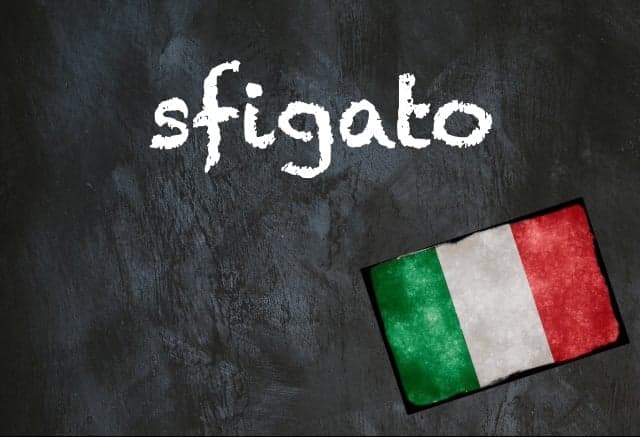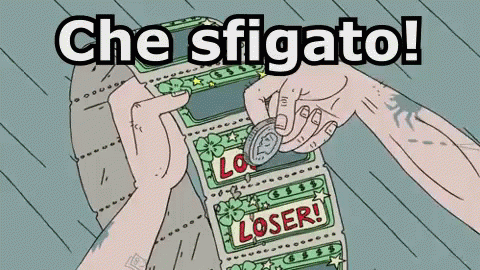Italian word of the day: 'Sfigato'

It would be unfortunate not to know this Italian word.
This Italian word can be described as unfortunate in more ways than one.
Sfigato in its most basic sense means 'unlucky'. But if you mean it as an insult, it means 'loser'. Click here to hear it pronounced.
To understand where it comes from you have to know a word that can get you into trouble, as some of our readers have found out for themselves: figa, the Italian equivalent of the c-word for a woman's private parts. (The masculine form of the word, figo, means either 'fig' or 'cool' and isn't vulgar in the least: find a full explanation here.)
Then you need to know that adding an s~ to the beginning of words in Italian can turn them into their opposite, the same way we add dis~ in English to make something a negative.
So sfiga literally means "without c***", or to put it another way, someone who isn't getting any action. Given how terrible Italians have seemingly judged this fate to be, sfiga became slang for 'bad luck'.
È caduto e si è rotto la gamba. Che sfiga!
He fell and broke his leg. What rotten luck!
Someone afflicted by sfiga is sfigato, or 'unlucky'.
Mia sorella ha vinto alla lotteria ma io sono sempre stata sfigato.
My sister won the lottery, but I've always been unlucky.
If you're not exactly sympathetic to this plight, you can use sfigato as a derogatory term: 'loser'. What else to call someone who never wins?
Lui è il ragazzo più sfigato della scuola.
He's the biggest loser in school.

You can use it for anyone who isn't cool – like a 'nerd' or a 'dork'. The same word can be an adjective ('dorky'): just remember to change the final vowel to match the person or people you're talking about.
Non portarti dietro la tua amica sfigata.
Don't bring your dorky friend along with you.
Sta sempre davanti al computer e non esce mai di casa, è una sfigata.
She's always on the computer and never goes out, she's a dork.
It applies not only to people who are unattractive or uncool, but to things that are similarly unappealing – like calling them "lame" or simply "crappy".
Mi ha invitato in un posto davvero sfigato.
He took me to a really lame place.
As you'll have gathered by now, the word is slangy at best and at worst pretty vulgar, so it's not one to use in formal situations (or with anyone over a certain age).
Do you have an Italian word you'd like us to feature? If so, please email us with your suggestion.
Make sure you don't miss any of our Italian words and expressions of the day: download our new app (available on Apple and Android) and then selecting the Italian Word of the Day in your Notification options via the User button.
Comments
See Also
This Italian word can be described as unfortunate in more ways than one.
Sfigato in its most basic sense means 'unlucky'. But if you mean it as an insult, it means 'loser'. Click here to hear it pronounced.
To understand where it comes from you have to know a word that can get you into trouble, as some of our readers have found out for themselves: figa, the Italian equivalent of the c-word for a woman's private parts. (The masculine form of the word, figo, means either 'fig' or 'cool' and isn't vulgar in the least: find a full explanation here.)
Then you need to know that adding an s~ to the beginning of words in Italian can turn them into their opposite, the same way we add dis~ in English to make something a negative.
So sfiga literally means "without c***", or to put it another way, someone who isn't getting any action. Given how terrible Italians have seemingly judged this fate to be, sfiga became slang for 'bad luck'.
È caduto e si è rotto la gamba. Che sfiga!
He fell and broke his leg. What rotten luck!
Someone afflicted by sfiga is sfigato, or 'unlucky'.
Mia sorella ha vinto alla lotteria ma io sono sempre stata sfigato.
My sister won the lottery, but I've always been unlucky.
If you're not exactly sympathetic to this plight, you can use sfigato as a derogatory term: 'loser'. What else to call someone who never wins?
Lui è il ragazzo più sfigato della scuola.
He's the biggest loser in school.

You can use it for anyone who isn't cool – like a 'nerd' or a 'dork'. The same word can be an adjective ('dorky'): just remember to change the final vowel to match the person or people you're talking about.
Non portarti dietro la tua amica sfigata.
Don't bring your dorky friend along with you.
Sta sempre davanti al computer e non esce mai di casa, è una sfigata.
She's always on the computer and never goes out, she's a dork.
It applies not only to people who are unattractive or uncool, but to things that are similarly unappealing – like calling them "lame" or simply "crappy".
Mi ha invitato in un posto davvero sfigato.
He took me to a really lame place.
As you'll have gathered by now, the word is slangy at best and at worst pretty vulgar, so it's not one to use in formal situations (or with anyone over a certain age).
Do you have an Italian word you'd like us to feature? If so, please email us with your suggestion.
Make sure you don't miss any of our Italian words and expressions of the day: download our new app (available on Apple and Android) and then selecting the Italian Word of the Day in your Notification options via the User button.

Join the conversation in our comments section below. Share your own views and experience and if you have a question or suggestion for our journalists then email us at [email protected].
Please keep comments civil, constructive and on topic – and make sure to read our terms of use before getting involved.
Please log in here to leave a comment.